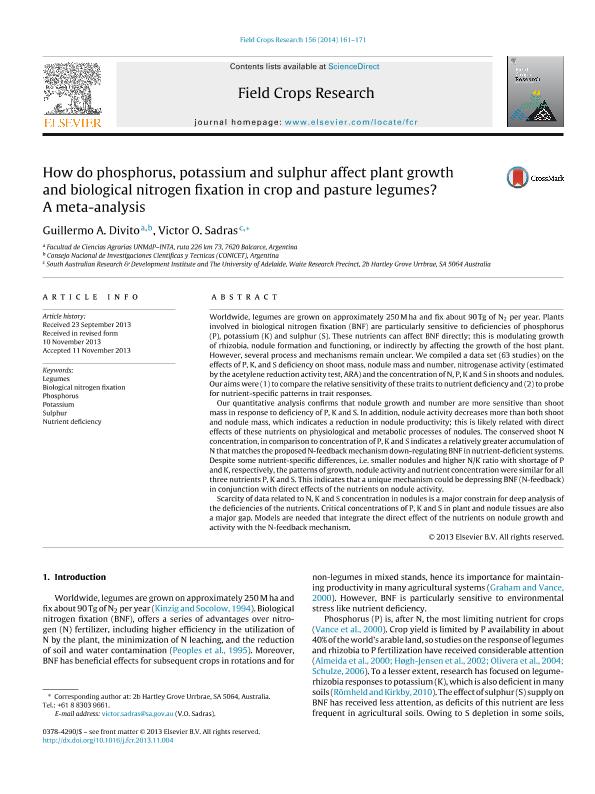Artículo
How do phosphorus, potassium and sulphur affect plant growth and biological nitrogen fixation in crop and pasture legumes? A meta-analysis
Fecha de publicación:
01/02/2014
Editorial:
Elsevier Science
Revista:
Field Crops Research
ISSN:
0378-4290
Idioma:
Inglés
Tipo de recurso:
Artículo publicado
Clasificación temática:
Resumen
Worldwide, legumes are grown on approximately 250 M ha and fix about 90 Tg of N2 per year. Plants involved in biological nitrogen fixation (BNF) are particularly sensitive to deficiencies of phosphorus (P), potassium (K) and sulphur (S). These nutrients can affect BNF directly; this is modulating growth of rhizobia, nodule formation and functioning, or indirectly by affecting the growth of the host plant. However, several process and mechanisms remain unclear. We compiled a data set (63 studies) on the effects of P, K, and S deficiency on shoot mass, nodule mass and number, nitrogenase activity (estimated by the acetylene reduction activity test, ARA) and the concentration of N, P, K and S in shoots and nodules. Our aims were (1) to compare the relative sensitivity of these traits to nutrient deficiency and (2) to probe for nutrient-specific patterns in trait responses. Our quantitative analysis confirms that nodule growth and number are more sensitive than shoot mass in response to deficiency of P, K and S. In addition, nodule activity decreases more than both shoot and nodule mass, which indicates a reduction in nodule productivity; this is likely related with direct effects of these nutrients on physiological and metabolic processes of nodules. The conserved shoot N concentration, in comparison to concentration of P, K and S indicates a relatively greater accumulation of N that matches the proposed N-feedback mechanism down-regulating BNF in nutrient-deficient systems. Despite some nutrient-specific differences, i.e. smaller nodules and higher N/K ratio with shortage of P and K, respectively, the patterns of growth, nodule activity and nutrient concentration were similar for all three nutrients P, K and S. This indicates that a unique mechanism could be depressing BNF (N-feedback) in conjunction with direct effects of the nutrients on nodule activity. Scarcity of data related to N, K and S concentration in nodules is a major constrain for deep analysis of the deficiencies of the nutrients. Critical concentrations of P, K and S in plant and nodule tissues are also a major gap. Models are needed that integrate the direct effect of the nutrients on nodule growth and activity with the N-feedback mechanism.
Archivos asociados
Licencia
Identificadores
Colecciones
Articulos(CCT - MAR DEL PLATA)
Articulos de CTRO.CIENTIFICO TECNOL.CONICET - MAR DEL PLATA
Articulos de CTRO.CIENTIFICO TECNOL.CONICET - MAR DEL PLATA
Citación
Divito, Guillermo Adrián; Sadras, Victor Oscar; How do phosphorus, potassium and sulphur affect plant growth and biological nitrogen fixation in crop and pasture legumes? A meta-analysis; Elsevier Science; Field Crops Research; 156; 1-2-2014; 161-171
Compartir
Altmétricas




